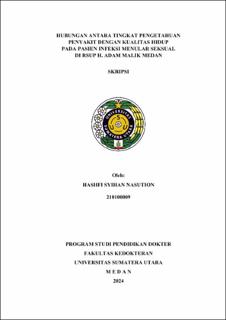Hubungan Antara Tingkat Pengetahuan Penyakit dengan Kualitas Hidup pada Pasien Infeksi Menular Seksual di RSUP H. Adam Malik Medan
The Relationship Between Disease Knowledge Level and Quality of Life in Patients with Sexually Transmitted Infections at RSUP H. Adam Malik Medan

Date
2024Author
Nasution, Hashfi Syihan
Advisor(s)
Nasution, Tetty Aman
Metadata
Show full item recordAbstract
Introduction: Sexually transmitted infections (STIs) are a significant health issue that can affect the overall quality of life of patients. Aim: This study aims to analyze the relationship between the level of knowledge about STIs and the quality of life of patients treated at RSUP H. Adam Malik Medan. Method: The research design used is a correlational analytic approach, involving 96 respondents selected through purposive sampling. Result: The study found a relationship between the level of knowledge about sexually transmitted diseases (STDs) and the quality of life of STI patients at RSUP H. Adam Malik Medan. The majority of respondents were HIV patients (64.6%), with the largest age group between 28-37 years (38.5%). Most of the respondents were workers (74%) and had a high school education (62.5%), with a male majority of 61 people (63.5%) and unmarried (51%). The analysis showed that 89.6% of respondents had good knowledge of STIs, with the highest level of knowledge among female respondents (97.1%) compared to males (85.2%). The quality of life of respondents was also identified as good (81.3%), divided into four aspects. There was a significant relationship between the level of knowledge about the disease and the quality of life of STI patients (p=0.000), with the physical quality of life being the highest aspect (86.5%), followed by psychological quality (41.7% very good and 52.1% good), social quality (74% good), and environmental quality (78.1% good). Conclusion: There is a positive relationship between the level of knowledge and all aspects of quality of life examined (p=0.000).
Collections
- Undergraduate Theses [2296]
